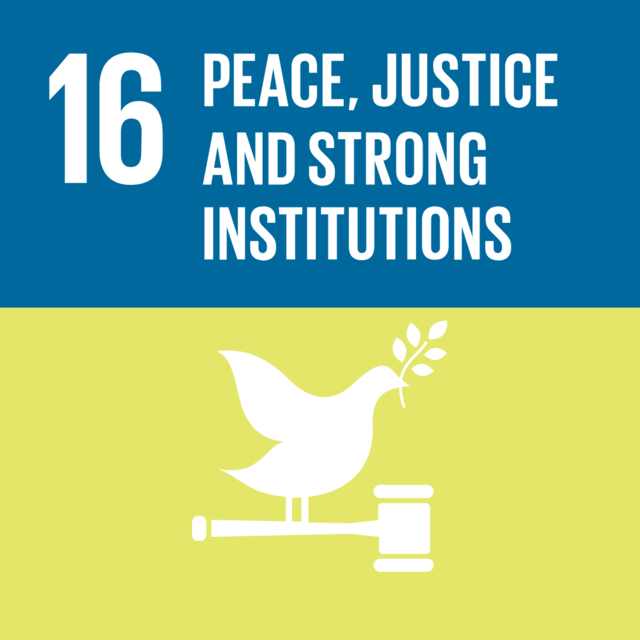We have talked about why peace, justice, and strong institutions are important last December, but in light of recent events including Russia’s invasion of Ukraine, ongoing violence in the West Bank, or the worsening treatment of women in Afghanistan, it seems that this cannot be reiterated enough. These, and many more global events highlight the indispensability of peace, accountability, equal access to the justice system, and a strong institutional framework that enforces laws.
SDG#16 Peace, Justice, and Strong Institutions: the cornerstone of a fair society
Armed conflicts are still the reality of far too many. Just in Ukraine and since February 2022, over 7 million have been misplaced and forced to flee the country. Globally, in 2018 over 70 million were fleeing war and persecution – a record high according to the UN Refugee Agency (UNHCR). Conflict and insecurity greatly threaten economies, livelihoods, health, and many other aspects of life, and therefore, sustainable development.
Most of those displaced – from Ukraine, and globally – are children and women. The pandemic has also further intensified children’s risk of exploitation and the number of children in child labour has risen for the first time in two decades in 2020. Children are more likely to be exploited if they are undocumented and one in four children still are born without being officially recorded and are therefore denied legal rights and representation.
The lack of institutional frameworks capable of preventing, controlling, and ceasing violence is then a huge barrier to recovery, lasting peace, and a healthy society. We must work towards establishing fair representation, and peaceful living conditions for all, everywhere.

Compassion and a strong moral compass is essential to every democratic society. Yet, persecution, injustice and abuse still runs rampant and is tearing at the very fabric of civilization. We must ensure that we have strong institutions, global standards of justice, and a commitment to peace everywhere.
United Nations
UCL and Peace, Justice, and Strong Institutions
UCL with its global reach is well positioned to support the sustainable development of justice systems, and the combatting of violence everywhere. For example, Dr Pan Engstrom from the UCL Institute of Americas has been working with human rights organisations in Chile to evaluate and implement torture prevention measures. His research informed Chilean law and contributed to strengthening institution’s power to prevent and eliminate torture in the country.
Coming to terms and understanding the past is a big part of starting recovery. UCL’s information researchers have been exploring ways to help people who have been in care to understand their past and memories all to enhance their sense of self. They designed a digital recording system that will help adults access their records and learn about their upbringing.
Not only UCL’s faculty and researchers, but its community too come together in times of crisis to help those in need. UCL’s student-led SSEES society have organised donation drives to collect essential supplies for Ukrainian refugees forced to flee their country. A tremendous effort from the students and staff of SSEES and the wider UCL community led to 4 lorries full of donations headed for Ukraine in early March.

Support a Goal #16 Charity
16.1. Significantly reduce all forms of violence and related death rates everywhere

The WONDER Foundation has worked for the last 5 years with Ukrainian families in Poland. Now, as millions Ukrainian women and children are entering the country, the Foundation – thanks to their existing ties and strong desire to help – are at the forefront of supporting Ukrainian families in Poland. Through organising fundraisers for them you can directly contribute to the meaningful work they are doing to minimise the impact of violence on the displaced.
Similarly, Westminster Befriend a Family organises mentoring programmes in London for those misplaced by the Afghan crisis to help them adjust to their new circumstances and thereby reduce the effect of conflict on families. Through mentoring a mum you can directly help minimise the impact of violence.
16.2 End abuse, exploitation, trafficking and all forms of violence against and torture of children

The National Society for the Prevention of Cruelty to Children works to protect children today, to prevent abuse tomorrow. As the UK’s leading children’s charity, they work to shield children from violence and rely on volunteers and donors to do so. As a Student Engagement Volunteer, or as a Social Media Champion you can spread the word of the vital work they do and help them raise funds to continue protecting children. If you would like to directly organise fundraisers, become a Poetry Night Coordinator to help put on events that bring in the much needed funds for NSPCC’s mission.
16.10 Ensure public access to information and protect fundamental freedoms, in accordance with national legislation and international agreements

Equal participation everywhere is a large part of helping and integrating those displaced by conflict or war. If you are an Eastern European language speaker, as a Service Provision Assistant for the Work Rights Centre you will be able to assist Eastern European clients, including Ukrainian refugees to understand their legal position and work rights in the UK, and to help them settle into life in Britain.
Now that term has ended and you have more time on your hands, if you are interested in how to help Ukrainian refugees in and from London check out our Ukraine – How to help page.

Crisis and war are all around us and it is becoming increasingly hard to turn a blind eye. Through helping those affected we can sooth the impact of violence on people’s lives, however, this must be paired with advocating for stronger institutions, the enforcement of law, and equal access to information and representation. Everywhere and for everyone.